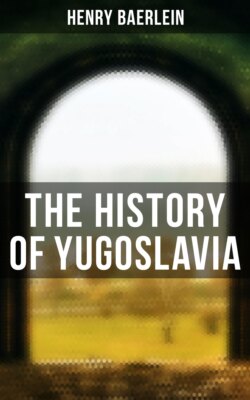Читать книгу The History of Yugoslavia - Henry Baerlein - Страница 64
На сайте Литреса книга снята с продажи.
THE SLAV SOUL OF CROATIA
ОглавлениеHis democracy, in spite of his agrarian reforms, was very far from that of Vuk, and far from that of a young noble of Croatia, Ljudevit Gaj, who one evening in the drawing-room of Count Drašković—the same Count Drašković who wrote in German, for such was the spirit of the time, his Exhortation to Croatian Maidens that they should be truly Croatian—well, in this gentleman's house at Zagreb Ljudevit Gaj recites some verses he has written for a dowager. They are in Slav. The audience is inclined to be amused. Of course they know something of the language because, like Anastasius Grün in the Slovene country, they talk it to the servants. But among themselves in Croatia the upper classes prefer to use Latin. There is no doubt, as Count Louis Voinović, a Yugoslav poet, has said, that this pursuit of Latin brought into the Slav world much that is indispensable in modern thought. It created among them an atmosphere of social courtesy, which, according to Saint Francis of Assisi, is the sister of Charity. It has humanized the Slav world and furnished it thus with formidable weapons. But, on the other hand, it cast a veil over the differences between the nations and caused people to be blind to their own national genius. The Croat nobility, with few exceptions, were at this time so much in harmony with the Magyar magnates, so anxious to prevent their peasants from hearing the Marseillaise, that they would, if need be, learn the Magyar language. But to use Slav in a drawing-room! This was a new idea. They smiled good-naturedly; but Gaj, with some other young men, some priests and some savants, founded a literary brotherhood that was to become famous under the name of "Danica." Famous also is an image he conceived. "The Southern Slavs," said he, in his programme of 1836, "are as a triangular lyre whose extremities are at Scutari, Villach and Varna." He said there was a time when the strings of this lyre resounded with harmonious sounds, but that the winds in their fury have torn them. Styria, Carinthia, Carniola, Croatia, Slavonia, Montenegro, Herzegovina, Serbia, Bulgaria and Southern Hungary are these broken strings, which it is necessary to repair. Let the people in these lands, he said, forget their religious differences and remember that they are the children of one mother. Let them write the same language. Gaj thus aimed at bringing Vuk's reforms to bear upon the Latin characters with which the Serbo-Croat language is written in Croatia. Before his party was victorious it had to vanquish most determined opposition. Pamphlet was hurled against pamphlet, grammar against grammar, Gaj and his men had to overcome not only those who were the guardians of tradition, but all those who thought it natural and proper that in syntax there should be some difference between the Croat and the Serb. Yet now the philologists are out and the poets; their business takes them between the legs of the Great Powers, where they sometimes come to grief, but they are striking all those fetters from their nation. Peter Preradović is born in the Military Frontier and he dies an Austrian General. At the beginning of his distinguished career he could speak nothing but German, and it was in emotional German poetry that he first expressed himself. But afterwards, carried away by the new winds that were cleansing the Croat language and sweeping from it the reproach of being a mere jargon for the servants, he became in his "Putnik" (The Traveller) and "Braca" (The Brothers) the greatest poet of the Croats. It is noteworthy that when this Austrian General writes a drama he takes for his hero the old legendary hero of the Serbs, Marko Kraljević. The Ban of Croatia, Ivan Mazuranić, is a Latin poet in his youth; but when this high official too comes under the stirring influence of Gaj he dedicates himself to his own people and composes in "The Death of Smail Aga"[40] a poem that among Serbian-speaking people has become so much the property of all that the poet has been lost in the shadow of his own work. Peasants who sing fragments of it as they toil in the fields, and the minstrel, the guslar, who chants it for them of an evening, believe that it is, like their folk-songs, the anonymous production of the Serbian people.
